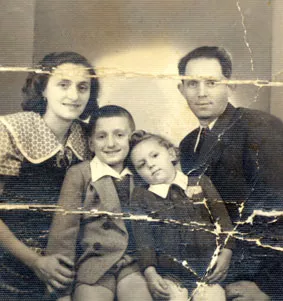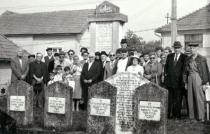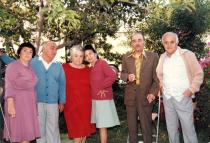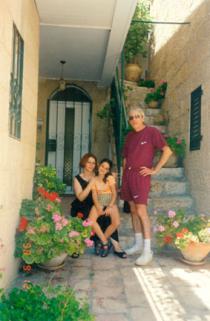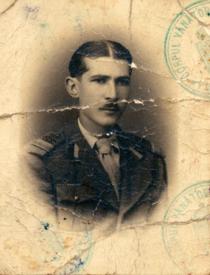Miriam and Hers Jakabovits with their children, Efraim and Smulik
This is my sister with her husband and two children.
We were only two children, me Edit Grossmann and my elder sister Miriam Jakabovits. My sister was born in 1920 in Nagyenyed. She attended the same school I did, primary in the Jewish school, then three more grades in the Romanian school. She was a much better student than me, she had brains. After she finished seven grades, she learnt hairdressing and manicure. [Editor's note: In Romania the elementary education was regulated by the law on public education of 1925. The law provided for the launching of grades 5-7 besides the existing four grades. Accordingly the elementary education was extended to 7 grades.] I could arrange hair as well, I also had clients, they came to the workshop late in the evening, and I put up their hair. And we had clients we were going to in the evening, after we finished our work, she at the hairdresser's salon, and me in the tailor's workshop. Oh, this is a tale, today if someone said such stories to somebody, that person would laugh. My sister bought curling-tongs, and we were heating up the iron above the Primus, and we put up the hair. Primus was a kerosene-fueled burner, but not that one used for lighting, but for cooking.
In 1941 they moved us to Gyulafehervar [29 km far from Nagyenyed]. First people from Marosujvar [the Jewish families living in Marosujvar] arrived in Nagyenyed, they arrived on a Monday, and they stayed for one week in Nagyenyed. When in 1941 the Jews from Marosujvar came to Nagyenyed, it was so interesting, that a widow came to us as well with her three daughters, I don't know what their name was, I didn't know them before. They arrived on a Thursday, they installed themselves in our house on a Friday, and this Hersi Jakabovits came to visit them. He saw my sister, and fell in love with her at once. Then in June 1941 we all had to go from Nagyenyed to Gyulafehervar, people from Marosujvar, from Tovis and Nagyenyed too at a quick pace.
In 1943 my sister got married - since she got married during the war, dad was very annoyed with her. There were a lot of quarrels, dad didn't quite support her getting married, he said that during war one shouldn't get married. Mom said: 'Let it be, if she wants to, let her get married.' It was a love match.
The husband of my sister was from Marosujvar. His parents had a bakery in Marosujvar - those days it was called Uioara -, they baked challah on Fridays - on Friday we, Jews bake the braided bread for Sabbath, we call it 'kajlics' [Editor's note: the local name for challah]. They baked cakes, if there was an anniversary, but they baked cakes in such huge baking dishes, I have never seen so big cakes, made of some thirty eggs. They were very skilful people. And in Marosujvar Jews were very religious. For example when my sister's wedding was, her father-in-law came to us. We had to pour water over his hands before he entered the house. And the cup's enamel was damaged a little. He didn't want to use that cup. Where could we find another cup, which is suitable for fast, of course? Finally mom sent me on the loft to bring down from the Pesach dishes I don't know which cup, because it was new.
At the wedding the bride was in a separate house, in her mother's house. In another house - Jews always preferred to live close to each other - there was the groom, and they prayed there. After that the father-in-law came, the family brought out the veiled bride in the yard, there they delivered her to the groom, then they went to the chupa. The chupa was set up strictly in the yard. Today the chupa too is inside, in the house, in the restaurant, where they celebrate the wedding, but formerly it was different. It was nice. The rabbi from Marosujvar conducted the service. The groom's family was so religious, that the rabbi from Nagyenyed wasn't competent enough for them, and they brought the rabbi from Marosujvar. And when the ceremony was over, the groom broke the glass: he threw it down and trampled on it, they said 'Mazel tov', and there were about three Gypsies, they begun to play. And we had dinner, and that was it. At that time they ate golden soup [meat-soup], that's how they called it, it was very fatty, today it's good for cholesterol. Usually people danced at weddings, on Jewish music, Hungarian music, it depended what kind of music one had on their wedding. We didn't dance at all at my sister's wedding, there was no dancing. It was impossible to dance, war was going on. Usually Jews from Marosujvar didn't dance, because they were very religious, they didn't dance anything else but those ancient Jewish dances, with handkerchief. I wasn't there, but I saw it once, I was at a wedding, and I saw this. Hasidim do dance, but they mustn't dance with girls. They are holding the handkerchief, they dance like that. But here in Nagyenyed it was not a custom, Nagyenyed wasn't a much too religious town, like Des for example, or like Marosujvar. In Nagyenyed we danced like others, a tango, because tango was fashionable then, they invited a Gypsy band, the bride or the groom hired them. But it was nice. These were old things, but nice things. Formerly it was nice, but it makes me laugh what it is today.
My sister's family lived in Marosujvar, they had their own apartment. My sister observed religion rigorously [after she got married], and she had a nice marriage. After the war ended, my sister's family lived in Marosujvar for a while, later they moved to Nagyenyed, because the sister [Magda Jakabovits] and the mother of my brother-in-law left for Israel. They lived in Nagyenyed until dad [Herman Grossmann] died [in 1964], when they all left [my sister, her husband and their two sons] for Israel, in Jaffa, they took mammy too. Before they left, he [my brother-in-law] was a leather trader, but he kept the accounts for the shop where he worked, and he became an accountant in Israel. My sister's husband was a very religious man, and he also knew all about it. And he started to teach my sister too [religion, Hebrew] at home, mainly before they left for Israel, and my sister was well up in it. Then she learnt Ivrit in Israel. But her husband died early of a cardiac infarct. And she was left alone, with her sons, they got married, they are comfortable off. She has two sons, one of them is Efraim, the other is Smulik. Miriam died exactly two years ago [in July 2003], it is Yahrtzeit.
